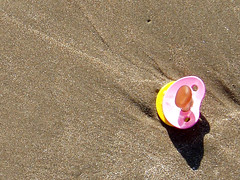- in Natural Baby by Alexis Rodrigo
BPA and Pacifiers
Bisphenol A, or BPA, was first synthesized in 1900, but it was not until the 1950s that scientists learned it could be “polymerized” into plastic. It is used in the manufacture of polycarbonate plastic. Polycarbonate plastic is used to make pacifier shields, which has many people concerned. There are health concerns associated with BPA, particularly with regard to the developing bodies of babies.
Concerns
BPA leaches out of polycarbonate plastics when the plastic is heated or damaged. Washing pacifiers in the dishwasher or sterilizing them with hot water could cause BPA to leach out. Damage can certainly occur in a pacifier; small children are rough on such items, and chewing can, according to a leading manufacturer of pacifiers, cause the BPA to leach out. It can then potentially be absorbed by ingestion or through the skin and/or mucus membranes.
Health Considerations
BPA is implicated in hormonal problems in the human body. BPA acts as an estrogen in the body, with the potential to cause hormonal imbalances, including decreased sperm production and early onset of puberty. Excess estrogen or estrogen dominance in the body is implicated in breast cancer. But what does this mean for babies and children?
-Aggressive behavior in toddlers has been linked to BPA exposure in a University of North Carolina study.
-Cancer is a concern with BPA. The chemical causes precancerous conditions in laboratory animals.
-Early onset of puberty may seem far away when you look at your baby, but it is prenatal and neonatal exposure that is implicated in later hormonal problems. BPA affects the health and integrity of reproductive organs as well.
-Heart disease and diabetes, in a British study, were implicated in BPA exposure. Those participants in the study who had these diseases were found to have higher concentrations (by as many as three times) more BPA in their systems as those who did not have these diseases.
-Autism may be linked to BPA exposure as well, even if a baby is exposed while still in the womb.
-The immune system may be adversely affected by BPA.
Alternatives
There are BPA-free pacifiers available. Silicone is a popular material for pacifiers, as is latex. Silicone is less likely to incite an allergic response, however. The following manufacturers make BPA-free versions of their pacifiers:
* Gerber
* Playtex
* BornFree
* Evenflo
These products should be labeled BPA-free. If you have any doubt, contact the manufacturer and find out what kinds of pacifiers they make that are free of BPA.
The best alternative? Just don’t use a pacifier!
If you liked this post, submit your email address below to get new posts by email:

